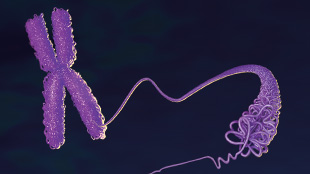Fascinating discoveries in epigenetics continue at a rapid pace:
Scientists May Have Finally Unlocked Puzzle of Why People Are Gay – US News and World Report ~ Transgenerational epigenetic inheritance may play a role in sexual orientation.
An Epi Phenomenon ~ Stephen Baylin discovered an epigenetic modification that occurs in most cancers. Baylin also identified a handful of tumor suppressor genes that are silenced by DNA methylation. Methylation of cytosine bases in the promoter region of genes plays a key role.
Inherited Resistance to Cocaine ~ Cocaine-using rat fathers pass epigenetic changes on to their sons that make them resistant to coke addiction.
Epigenetic changes accrued over an organism’s lifetime may leave a permanent heritable mark on the genome, through the help of long noncoding RNAs.

Excerpt:
Just as epigenetics was gaining acceptance within the general scientific community, scientists began reporting observations of a newly identified phenomenon called transgenerational epigenetic inheritance, or the passage of epigenetic changes from a parent to its offspring. Recent experimental work in mice, worms, and pigs has found evidence that some degree of transgenerational epigenetic inheritance may take place.[1. B.T. Heijmans et al., “Persistent epigenetic differences associated with prenatal exposure to famine in humans,” PNAS, 105:17046–49, 2008.],[2. T.B. Franklin et al., “Epigenetic transmission of the impact of early stress across generations,” Biol Psychiatry, 68:408–15, 2010.],[3. O. Rechavi et al., “Transgenerational inheritance of an acquired small RNA-based antiviral response in C. elegans,” Cell, 147:1248–56, 2011.],[4. M. Braunschweig et al., “Investigations on transgenerational epigenetic response down the male line in F2 pigs,” PLoS ONE, 7: e30583, 2012.]
A fascinating 2008 study that looked at people born during the Dutch Hunger Winter in 1944–1945 hints at the possibility that transgenerational epigenetic inheritance also occurs in humans.1 Adults who were conceived during the famine had distinct epigenetic marks that their siblings born before or after the famine did not. These marks reduced the production of insulin-like growth factor 2 (IGF2) and affected the growth of the famine-gestated children. Notably, these marks were retained for several decades in the afflicted individuals. While these observations suggest the possibility of transgenerational epigenetic inheritance, the modifications could also have occurred in utero as a result of famine conditions rather than being inherited in the germline. Therefore, whether such a distinct phenomenon occurs in humans remains to be definitively determined.
However, in model experimental systems, there is strong evidence for transgenerational epigenetic inheritance.2,3,4 In one study carried out in mice, an environmental stress that resulted in aggressive behavior in males caused the same behavior in their offspring.[5. T.B. Franklin, I.M. Mansuy, “Epigenetic inheritance in mammals: evidence for the impact of adverse environmental effects,” Neurobiol Dis, 39:61–65, 2010.] Notably, the offspring had changes in the DNA methylation patterns of particular genes. Collectively, these and other transgenerational studies all point to the notion that selective pressure can be applied from the environment and passed on to daughter cells and offspring.
Full article: Lamarck and the Missing Lnc | The Scientist Magazine®.



